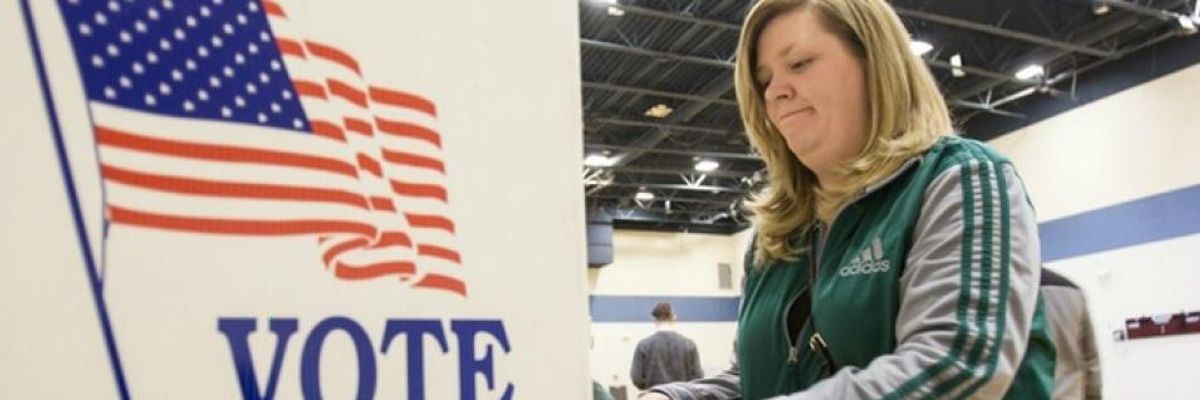Mayors of 10 major cities across Wisconsin are calling on the state's Department of Health Services to use emergency authority to halt in-person voting for Tuesday's planned election after the state's Republican-controlled legislature adjourned a special Saturday session called by Democratic Gov. Tony Evers within seconds, refusing to take action on voter safety concerns related to the coronavirus pandemic.
In a letter (pdf) sent Sunday, the mayors--who collectively represent over 1.3 million constituents--told Andrea Palm, the state's DHS Secretary-designee, that "we believe it would be irresponsible and contrary to public health to conduct in-person voting throughout the state at the very time this disease is spreading rapidly."
The letter says:
As leaders of communities throughout Wisconsin, we write to ask you to exercise the emergency powers delegated to you under section 252.02 of the Wisconsin State Statutes. We implore you to implement all emergency measures necessary to control the spread of COVID-19, a communicable disease. Specifically, we need you to step up and stop the state of Wisconsin from putting hundreds of thousands of citizens at risk by requiring them to vote at the polls while this ugly pandemic spreads.
The mayors emphasize that while the election has already begun and returned absentee ballots should be counted, the state's political leaders must "ensure every eligible voter has the right to vote without jeopardizing their health."
Signatories to the letter are Mayors Tom Barrett of Milwaukee, Eric Genrich of Green Bay, Lori Palmeri of Oshkosh, Tim Kabat of La Crosse, John Antaramian of Kenosha, Cory Mason of Racine, Tim Hanna of Appleton, Satya Rhodes-Conway of Madison, Karen Mischel of Viroqua, Kathy Ehley of Wauwatosa.
"We recognize that you and your department have the authority to take this action, but that you do not have the authority to determine the modifications necessary to conclude this election," the letter to Palm continues. "That power lies in the legislative branch and with the governor."
Evers has encouraged state Assembly Speaker Robin Vos and Senate Majority Leader Scott Fitzgerald to take up legislation to convert Tuesday's election to mail-in only and set a May 26 deadline for returning ballots, but the state's Republican legislative leaders have fought against attempts to cancel in-person voting."
The mayors call on Evers and the state legislature to mail every registered voter a ballot, pointing out that "EVERY other state that faced this issue during the pandemic has crafted a solution that respects democracy and protected the health of their citizens."
Reporting on the letter Sunday, Politico noted:
The plea from the mayors could mirror a move that took place in Ohio. After a court declined to postpone Ohio's primaries, which were originally scheduled for March 17, Gov. Mike DeWine's top health official shuttered polling places. The move did not formally postpone Ohio's primary but effectively did as much, leading the legislature to ultimately extend absentee voting in the state through April 28.
Meanwhile, the legal battle over absentee voting ahead of Wisconsin's primary, which is expected to have significantly lower turnout, is now in the hands of the U.S. Supreme Court.
GOP leaders in Wisconsin are asking the U.S. Supreme Court to issue a stay on a decision from U.S. District Judge William Conley, who declined to postpone the election but extended the deadline to receive absentee ballots from 8 pm on Tuesday to 4 pm on April 13. The 7th U.S. Circuit Court of Appeals has rejected a Republican attempt to challenge Conley's ruling.
Wisconsin-based journalist John Nichols wrote for The Nation Monday that Conley's order was "the beginning of a credible response, but it's insufficient," pointing out that "Wisconsinites who did not request absentee ballots by April 3 now have no option except in-person voting."
"Don't ask voters to cast ballots on Tuesday," wrote Nichols. "Instead, further extend the period for requesting and casting absentee ballots so that voters do not have to risk getting a deadly disease in order to vote in the presidential primaries and state and local elections."
Referencing the governor's initial proposal that's so far been ignored by GOP legislative leaders, he added:
Vos and Fitzgerald can negotiate with the governor. But they have to recognize that proceeding with in-person voting on Tuesday is unsafe and undemocratic.
If they fail to reconsider, the governor should order the extension that he has proposed. In a memorandum issued Thursday, Madison City Attorney Michael May explained that Evers is empowered to "authorize and implement all emergency measures necessary to control communicable diseases."
The governor does not have to postpone the election. But, one way or another, he must extend it.
Nichols also noted that "communities across the state do not have enough poll workers to open regular polling places."
Two Democratic members of the Wisconsin Elections Commission, Ann S. Jacobs and Mark L. Thomsen, sent a letter to Vos and Fitzgerald on Sunday warning that "in the face of a deepening and escalating COVID-19 crisis, forcing an in-person election on Tuesday not only threatens the voters, the clerks, and election staff, it threatens everyone those people subsequently come into contact with at home and elsewhere."
However or whenever the Wisconsin election moves forward, voters statewide are expected to weigh in on the Democratic presidential primary race that's down to former Vice President Joe Biden and Sen. Bernie Sanders (I-Vt.), hundreds of candidates for local offices, and a closely watched state Supreme Court contest that could have national consequences.
